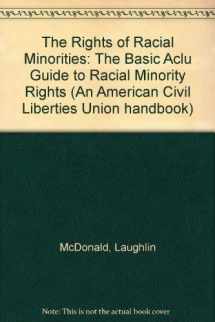
The Rights of Racial Minorities, Second Edition: The Basic ACLU Guide to Racial Minority Rights (ACLU Handbook)
ISBN-13:
9780809318889
ISBN-10:
0809318881
Edition:
2nd
Author:
john a. powell, Laughlin McDonald
Publication date:
1993
Publisher:
Southern Illinois University Press
Format:
Paperback
304 pages
FREE US shipping
Book details
ISBN-13:
9780809318889
ISBN-10:
0809318881
Edition:
2nd
Author:
john a. powell, Laughlin McDonald
Publication date:
1993
Publisher:
Southern Illinois University Press
Format:
Paperback
304 pages
Summary
The Rights of Racial Minorities, Second Edition: The Basic ACLU Guide to Racial Minority Rights (ACLU Handbook) (ISBN-13: 9780809318889 and ISBN-10: 0809318881), written by authors
john a. powell, Laughlin McDonald, was published by Southern Illinois University Press in 1993.
With an overall rating of 4.1 stars, it's a notable title among other
books. You can easily purchase or rent The Rights of Racial Minorities, Second Edition: The Basic ACLU Guide to Racial Minority Rights (ACLU Handbook) (Paperback) from BooksRun,
along with many other new and used
books
and textbooks.
And, if you're looking to sell your copy, our current buyback offer is $0.5.
Description
Using a question-and-answer format, this book makes clear how to take advantage of the laws designed to secure the rights of racial minorities. Individual chapters explain the federal civil laws and procedures protecting the rights of racial minorities in voting, employment, education, housing, public accommodations, federally assisted programs, and jury selection and trials. Relevant criminal statutes and the use of race-conscious remedies are covered as well.The initial basis for the rights of racial minorities was provided by three constitutional amendments adopted following the Civil War during the period of Reconstruction: the Thirteenth Amendment, which outlaws slavery and involuntary servitude; the Fourteenth Amendment, which prohibits states from denying to any person "equal protection of the laws"; and the Fifteenth Amendment, which prohibits denial or abridgment of the right to vote.Each of the Reconstruction amendments authorized Congress to enforce the amendments "by appropriate legislation." Congress has done so repeatedly. The most important of the Reconstruction laws were the Civil Rights Act of 1866, the Civil Rights Act of 1871, and the Civil Rights Act of 1875, which was declared unconstitutional in 1883. In response to the Civil Rights Movement of the 1960s, Congress enacted and amended a number of modern civil rights acts including the Civil Rights Act of 1964; the Voting Rights Act of 1965, amended in 1970, 1975, and 1982; and the Fair Housing Act of 1968 to ensure equality and eradicate the continuing effects of past discrimination accumulated over more than two centuries. The challenge to the nation remains to bring reality to the declared principle that "all persons are created equal."


We would LOVE it if you could help us and other readers by reviewing the book
Book review

Congratulations! We have received your book review.
{user}
{createdAt}
by {truncated_author}


